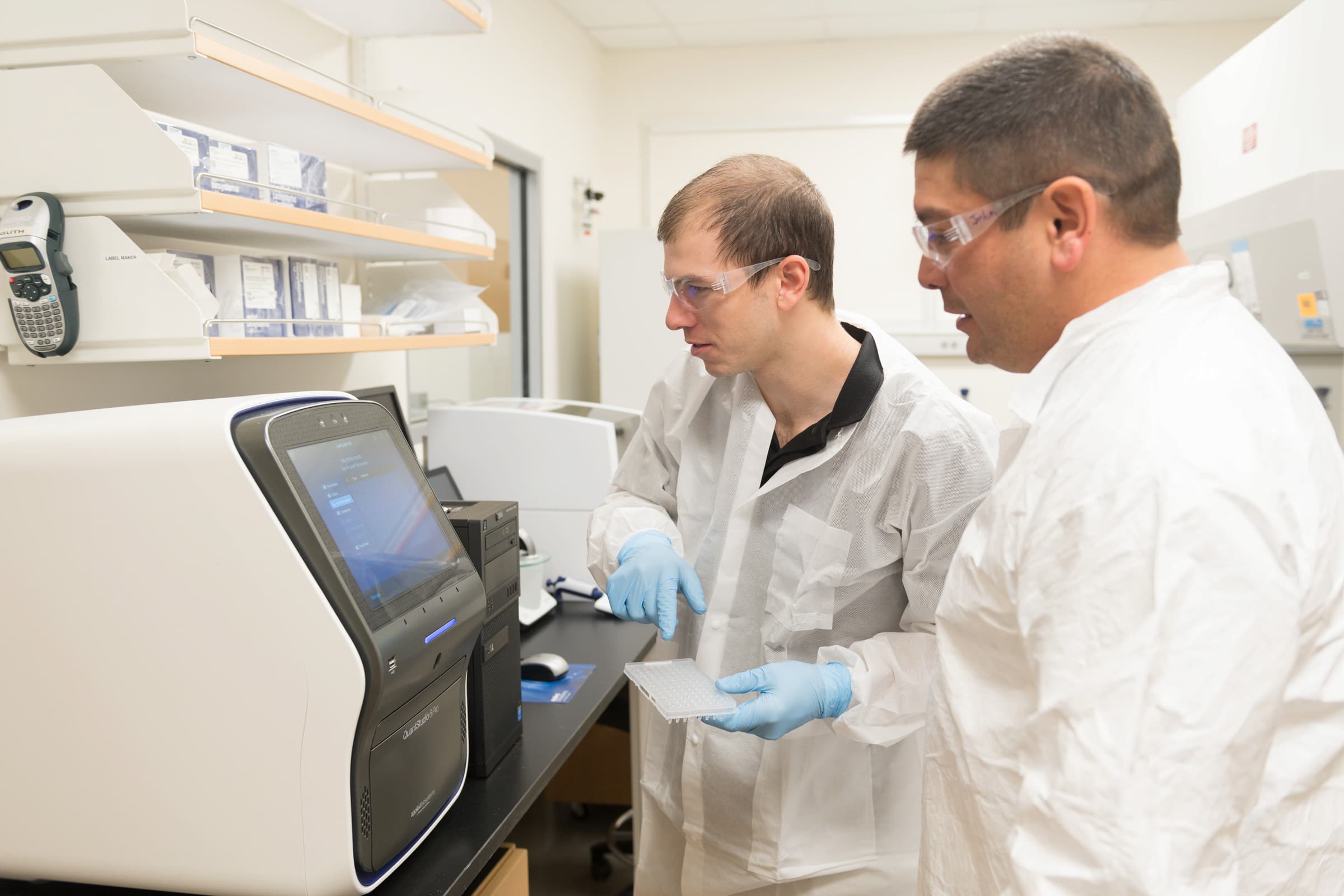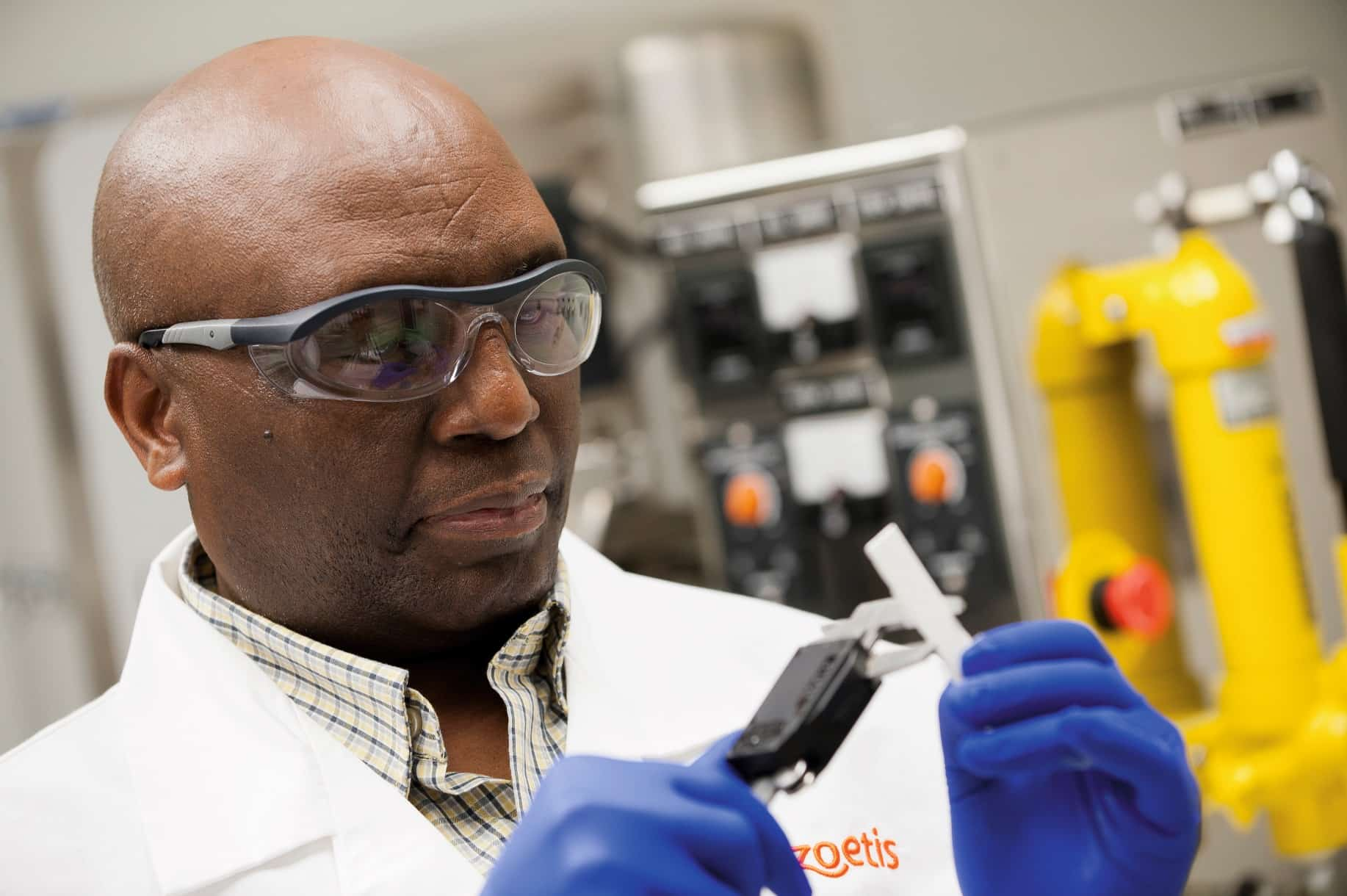
Center for Transboundary and Emerging Diseases
Combatting Emerging, Infectious Diseases in Animals
According to the World Health Organization, over the past 30 years, approximately 30 new pathogens have been identified in humans with 75% of those diseases having an animal origin. As we build on our purpose to nurture the world and humankind by advancing care for animals, our scientists take a One Health approach to combating diseases that pose the greatest risk to animals and humans.
Read more about how our innovation work supports our Driven to Care sustainability aspirations to provide vaccines to regions in need, including rabies vaccines to the World Organisation for Animal Health (WOAH) vaccine bank, and the work we do to expand access to veterinary care in Sub-Saharan Africa.
Diseases we’re focused on
Highly Pathogenic Avian Influenza (HPAI) continues to pose an unprecedented threat to poultry worldwide. Since early 2024, HPAI also has been confirmed and continues to spread in dairy cattle in the U.S. as well as other mammals throughout the world.
We routinely update our vaccines to ensure they match current virulent strains. Zoetis received a conditional license in the U.S. and Canada from USDA Center for Veterinary Biologics for our Avian Influenza vaccine H5N2 Subtype, Killed Virus, for chickens. This vaccine is designed to match the current strain circulating in poultry and be differentiated from naturally infected birds. In addition, we have received a conditional license from the USDA Center for Veterinary Biologics (CVB) for Avian Influenza Vaccine, H5N2 Subtype, Killed Virus for use in lactating dairy cattle.
Zoetis has a long history of developing vaccines for avian influenza and stands ready to work with our customers and government authorities to provide the right mix of tools for their prevention strategies, including vaccine development if warranted. It is important to note that the decision to vaccinate poultry flocks remains with national regulatory authorities in consultation with their local poultry sector.
Our scientists first worked on HPAI vaccines in 2001-02 when outbreaks occurred in flocks in Southeast Asia. In 2006, we utilized our reverse genetics system to develop and license an Avian Influenza H5N3 vaccine to address a global outbreak. And, in 2016, we developed an H5N1 vaccine, which was conditionally licensed by the USDA and sold to the U.S. National Veterinary Stockpile that year. We provided this H5N1 vaccine to the USDA for U.S. Fish & Wildlife Service’s emergency use in California Condors in 2023. In 2024, our team in New Zealand collaborated with the Department of Conservation to provide our H5N3 vaccine to help protect endangered birds.
While African Swine Fever (ASF) is not a health danger to people, it can devastate pigs and severely impact swine producers’ livelihoods. Often fatal to pigs, ASF has been around since the early 1900s. In August 2018, ASF was reported for the first time in China, the world’s largest pig producer. It rapidly spread throughout China and to 16 Asian and 2 Oceanic countries. In 2021 the disease reappeared in the Americas after an absence of almost 40 years, having been introduced in Dominican Republic and later in Haiti. Further disease spread in 2022 included Europe, India and other parts of Asia.
ASF is a challenging virus to develop a vaccine for as there are multiple strains (genotypes) of the virus. It is a large and complex virus, composed of a double-stranded DNA genome containing up to 190 kilobase pairs, which encode more than 160 genes. Zoetis has several internal and external projects seeking to develop a solution to ASF. Zoetis is an industry partner in the EU-funded international collaborative project ASFaVIP led by Dr Sandra Blome of the Friedrich-Loeffler-Institut (FLI). The primary objective of the project is to develop and make available an oral vaccine for the European market.
The World Health Organization (WHO) estimates rabies kills 59,000 people each year, primarily in Africa and Asia. Rabies is a zoonotic disease, and vaccinating dogs can help save human lives. Zoetis has provided canine rabies vaccines to the World Organisation for Animal Health (WOAH) rabies vaccine bank, so far delivering needed vaccines to multiple countries in Africa and Southeast Asia. Zoetis supports the Zero By 30 Strategic Plan initiated by the United Against Rabies collaboration which is comprised of WHO, WOAH, the Food and Agriculture Organization of the United Nations (FAO), and the Global Alliance for Rabies Control (GARC).
A viral disease that infects ruminants including cattle, goats and sheep, Bluetongue Virus (BTV) has historically been a problem in tropical and sub-tropical regions of the world. However, in the past several decades, the World Organisation of Animal Health (WOAH) reports the disease has been migrating north including to multiple European countries. The disease is transmitted by biting midges, and rising temperatures mean the insects – and thus the virus – can persist during the winter months. To support livestock farmers, Zoetis is monitoring the epidemiology of the new serotype BTV3 that recently appeared in Europe and is exploring potential vaccine options.
Affecting cattle and water buffalo, Lumpy Skin Disease (LSD) is endemic in most countries of Africa, and the disease also has been reported in China and southeastern Asian countries. It also has been detected in countries close to Australia, including Indonesia, but continues to be an emerging threat as it spreads through Asia. LSD is not zoonotic and thus not a health threat for people. Zoetis remains committed to supporting livestock farmers and continues to monitor the disease through our surveillance network.

Events where our Zoetis scientists have presented
- World One Health Congress
- International Society for Vaccines Congress
- World Vaccine Congress events in Washington, D.C. and Europe
- Veterinary Comparative Respiratory Society Symposium
- EPIZONE European Research Group
Links to Important Transboundary and Emerging Disease websites*
World Organization for Animal Health
Food and Agriculture Organization of the United Nations
World Reference Laboratory for Foot and Mouth Disease
Global Foot and Mouth Disease Research Alliance (GFRA)
European Commission for the Control of Foot-and-Mouth Disease (EuFMD)
*The above listed sites are not the property of Zoetis.